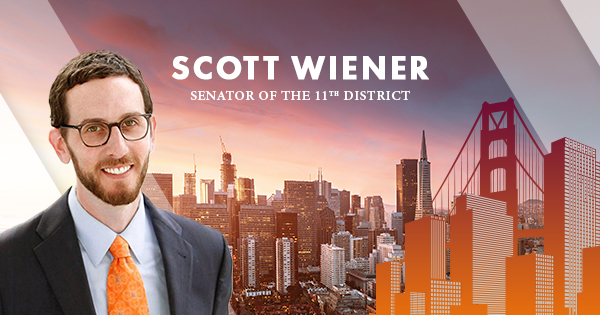SACRAMENTO – The Legislature passed Senator Scott Wiener’s (D-San Francisco) Senate Bills 957 and 988. SB 937 bill provides flexibility for builders amid challenging market conditions. It passed the Assembly 63-1 and the Senate 30-1, and now heads to the Governor. SB 988 provides basic protections for freelance workers, who are too often denied payment for their services. It passed the Senate 33-3 and heads next to the Governor.
“We can’t fix a problem we can’t measure, and with SB 957 we can take a critical step to delivering true health equity,” said Senator Wiener. “California must begin collecting the full range of data needed to understand the unique health challenges faced by LGBTQ people.”
“It’s also critical that California protect its most vulnerable workers,” said Senator Wiener. “Freelancers are too often exploited by their employers, who sometimes avoid paying freelancers what they are owed. SB 988 takes a bold step toward justice for this massive sector of the workforce.”
SB 957
SB 957 enacts the full recommendations of last year’s state audit, which found that the California Department of Public Health’s (CDPH) failure to collect SOGI data impacted its ability to protect LGBTQ health. It builds on SB 932 (Wiener, Chapter 183, Statutes of 2020) and AB 959 (Chiu, Chapter 565, Statutes of 2015), which enacted the first requirements for the collection of SOGI data from state health agencies. Last year’s audit found that the state health department is sidestepping these requirements, and SB 957 closes the loopholes that allows evasion of the intent of laws that have been on the books for nearly a decade.
“Last year’s state audit revealed that the California Department of Public Health is failing in its duty to collect complete data on California’s LGBTQ+ community,” said Equality California Executive Director Tony Hoang. “SB 957 is an important step forward to close loopholes in existing law and gain a comprehensive picture of the health needs of LGBTQ+ Californians. We are deeply grateful to Senator Wiener for his longtime leadership on this issue and to the California Legislature for ensuring that the health and wellbeing of LGBTQ+ Californians are not forgotten in any aspect of our public health system.”
“SB 957 is necessary to better understand the needs, care, and services of people of all identities and the extent to which there may be disparities in health, services, and access to care challenges across LGBTQI+ populations.,” said Dannie Ceseña, Director at the California LGBTQ Health and Human Services Network. “As California engages in the emerging practices of utilizing specific data elements, such as SOGI data, we can ensure that CDPH responses are directed where they are most needed. We’re grateful to Senator Wiener for continuing to be champion on this issue.”
“San Francisco AIDS Foundation thanks the California State Legislature for passing SB 957 and prioritizing health equity for LGBTQ+ people in our state. As we work on the ground to deliver services for our LGBTQ+ clients, we recognize the structural forces that shape our understanding of queer health issues, the disproportionate impacts of conditions on queer communities, and ultimately our provision of care. Better data will help us extend the quality and reach of services, and the ability we have to tailor our services to best meet the needs of those we serve,” comments Tyer TerMeer, CEO.
To ensure that CDPH collects complete SOGI data to effectively implement and deliver critical services for LGBTQ+ people, SB 957 will Implement the recommendations from the audit report by amending existing law to require CPDH to:
- Collect SOGI data from third-party entities, including local health jurisdictions, on any forms or electronic data systems unless prohibited by federal or state law;
- Provide an annual report to the public and to the Legislature on its efforts to collect, analyze, and report SOGI data;
- Improve services or program outcomes for underserved LGBTQ+ communities;
- Allow voluntarily provided SOGI data to be included with the immunization data
SB 957 is sponsored by Equality California, the California LGBTQ Health & Human Services Network, the San Francisco AIDS Foundation, and the California Legislative LGBTQ Caucus as a co-sponsor.
SB 988
SB 988 passed 70-0 and heads next to the Senate for a concurrence vote before heading to the Governor for a signature.
Freelancing is a rapidly growing and crucial sector of the economy. In 2022, 60 million Americans freelanced, making up 39% of the total workforce and contributing $1.35 trillion to the national economy.
Most freelancers lack basic worker protections, most notably, the right to be paid for their work on time. According to the Freelancers Union, 71% of workers experienced late or non-payment. 59% report living paycheck to paycheck. Most do not have written contracts, as only 25% reported that they consistently have written contracts.
The Freelance Worker Protection Act provides basic protections, including:
- Mandatory contracts: Any freelancer performing over $250 of work for a hiring entity over a four month period is entitled to a contract outlining the scope of the work expected, the rate of pay, and the method of payment.
- 30-day payment terms: Clients must pay their freelancers within 30 days of completion of work unless otherwise specified in the contract.
- Payment agreement protections: Clients cannot require that freelancers accept less than the contract stipulates in exchange for faster payment.
- Anti-retaliation: Clients cannot retaliate against freelancers for pursuing payment.
- Double Damages: Freelancers who are the victim of non-payment are entitled to damages equal to double the payment originally specified in their contract, plus costs and attorney’s fees.
SB 988 is sponsored by the California Teamsters Public Affairs Council and the National Writers Union.
###


